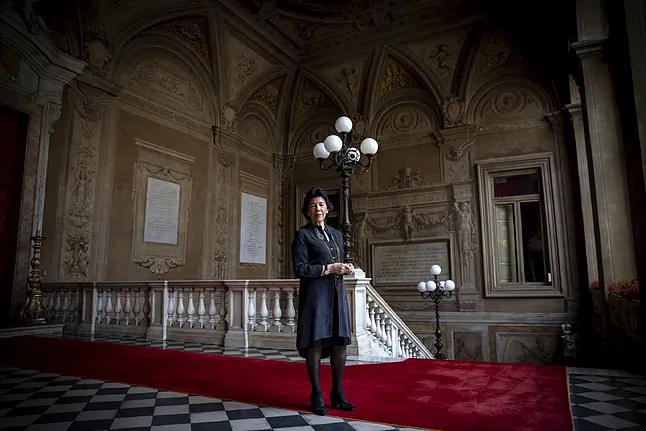The former Minister of Education of Spain and first spokesperson of the Pedro Sánchez government has been serving as Spain's ambassador to the Holy See for three years now, a highly sought-after position. She speaks highly of the recently deceased Pope, whom she had the fortune to know and interact with closely. It has been 20 years since the funeral and burial of a sitting Pope has been held in Rome, and the embassy is preparing all the details for the State delegation that will represent Spain at the funeral of Francis.
How are you experiencing these historic days in Rome?
With a lot of emotion and intensity. We got to know Pope Francis very well from the day of presenting credentials. He welcomed me saying, 'Don't make too much effort, ambassador, because I know your whole life very well.' We talked about education. Like me, he had also dedicated himself to education, and we agreed on the importance it has for empowering the most vulnerable.
What does the Church lose with the death of Francis?
A lot, the world in general loses a lot. We would have needed him to last a little longer. We have lost a great Pope, who has been very beneficial for the Church and the world. He was graceful in his legacy and very graceful in his departure. He continued with his silver cross and black shoes, wanted to be named after the poor man of Assisi, and anyone who reads his Easter message will realize that it is the personal and political testament of a man who understood all the world's problems. He was a great ruler.
Does this mean that besides being the Pope of the poor, he was also a man of power, as a good Jesuit?
The Society of Jesus must be very proud to have contributed a Pope like him to the Church. He was a man who communicated with his mere presence and spoke in headlines, which is why he sometimes got into trouble. But he was also a governing Pope, a man who knew how to manage his position autonomously. It is important to note that the Pope is not only a spiritual leader but also a political leader. The Vatican is the smallest country in the world but with the largest jurisdiction. The Pope is a monarch, with all powers, and he also had a personal strength derived from being familiar with all human matters. In recent times, he surrounded himself with advisors and experts in Artificial Intelligence to warn of its risks and also harness its potential for humans. He spoke for the first time about the Amazon, when no one else was considering it, about climate change. He opened folders and sought paths, paving the way for reforms, some of which he completed, such as the Vatican's financial reforms.
And some he left unfinished...
He opened other paths, but they are still in progress. Like the fight against child abuse, which he denounced vigorously. Or the changes in liturgy. He did not like the Church to close in on itself, the clericalism that only talked about its own affairs. That's why he addressed synodality, the open process for everyone to adapt responses to the problems of a vibrant society in an open Church.
Do you believe that the cardinals will choose a successor who follows the path of this Pope of the poor, or the margins?
It would be highly desirable for that continuity along the path he has set. It would be very surprising if we were to return to a more exclusive or exclusionary pomp. It would be strange to both insiders and outsiders. Each person has, we have, a different style. But the Church cannot miss the reference that Francis has been in any way; the cardinals are intelligent people. The strength of the departed Pope was so great that it will prevent a return to other styles of papacy.
Has Francis' papacy strengthened the Church, then, despite the advance of secularism?
Francis' contribution has been so significant that the Catholic Church has grown, not only in the West but also in the East, with his maintained relationship against all odds with the Chinese bishops.
Were the conflicts with the Curia as intense as they say?
That was talked about a lot, although he always downplayed it. He said he didn't have time to think about those things, he woke up at four-thirty in the morning, and didn't stop all day, having audiences with all kinds of people, including ordinary folks.
Why, despite having such close relations with the Spanish Government, did he never visit Spain?
Just as he didn't visit other European places. But he did have the intention and decision to go to the Canary Islands to address the immigration phenomenon. Like he did in Lampedusa. He planned to do it, but time ran out for him; on December 8, when he came to the Plaza de la Inmaculada to offer flowers, he was already having breathing problems. Although we never thought the end was so near.
What do you expect from the conclave?
I believe the conclave will choose a Pope fairly and quickly. Conversations and disagreements that may exist have already been settled. The movement in favor of Francis, a true 'Francismania,' has surprised even the most Vatican-savvy. The conclave has a lot to choose from. If the world turns towards the East or the Indo, there are cardinals of great stature. We would like a Spanish Pope, of course, as would the Italians; Parolin, for example, is an extraordinary cardinal.
Does it hold any significance that despite the excellent relationship Francis had with members of the Government, the President is not attending the funeral?
Nothing. It doesn't mean anything. There is usually a division of roles with the Head of State in foreign visits. The President had a very good and sincere relationship with Pope Francis.
